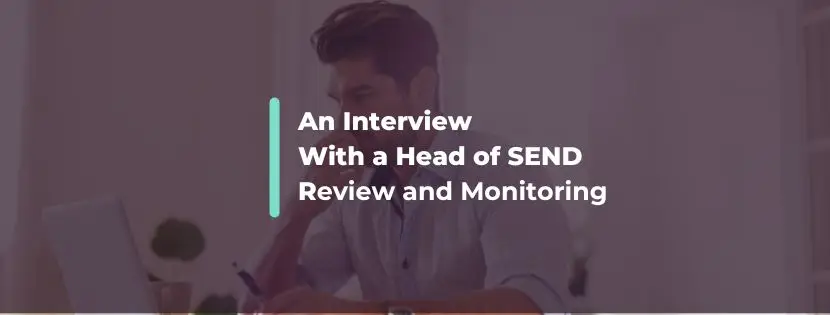From Teaching Assistant to SEND Team Manager: Discover The Career Journey of a SEND Case Officer
24 May, 20241-2 minutes
In this blog, you will learn:
- About the various roles and responsibilities working within SEND at a local authority.
- Lessons and tips from a SEND Case Officer to thrive and succeed in the industry.
- How to find and apply for the best SEND Case Officer jobs.
SEND Case Officers play a critical part in ensuring that children with SEND receive appropriate support within an educational setting. If you’ve ever wondered about the people who are behind the scenes in these important roles, we recently chatted to SEND specialist, Ems Curtis to discover more.
Ems Curtis has over 10 years experience in education, and over 7 years in the SEND industry. From working as a Casework Assistant, to a SEND Team Manager, Ems has worked her way up in various roles within different local authorities.
After a short break and in search of some remote work, Ems started a new role as a SEND Case Officer for children up to the age of 14.
Throughout this interview, you’ll discover how Ems utilised her own personal experience of SEND and her career experience to achieve the best outcomes for children and young people with SEND.
Tell us about your career journey so far
I’ve been quite lucky in that my career has been quite a step-by-step pathway. I started off as a Teaching Assistant having just graduated from university, where I supported children with a range of SEND in a large mainstream school.
Eventually, I made my way into the world of working within a Local Authority and began to work as a Casework Assistant for 3 years. This role gave me a fantastic opportunity to experience the ins and outs of the job and see the background work that lends itself to the job.
I absorbed all the experience I gained though and eventually moved to another Local Authority to become a SEND Officer.
How did your previous career experience prepare you to become a SEND Case Officer?
I was initially a bit worried about the jump from my Casework Assistant role to a SEND Case Officer as the career pathway between the two authorities didn’t quite align up, but thankfully I was well supported in my new team and learned the processes quickly. I also learned systems quickly which helped a lot as there are now several different systems in use!
During Covid, an opportunity arose to be part of a team in my existing Local Authority to lead a team of Caseworkers who would be responsible for providing support with the backlog of Annual Reviews within the county. This was my first step into a management role and that was quite nerve-wracking!
My co-manager was fantastic though, and my team was great at supporting one another. This helped with supporting a case for a restructure within the county and eventually the team continued to exist, though my role ended (as it was a secondment), and I changed roles again and moved into the tribunals team.
Working as a SEND Tribunal Officer was useful as I feel tribunals give you a great insight into the processes and really help with consolidating your knowledge of the laws around SEND. I did however miss the management side of things, so I later applied for a management role in another Local Authority.
I was successful and became a SEND Team Manager. Although the role was much more demanding, I really enjoyed the nature of it and still miss it today.
Unfortunately, the location was not ideal for being on-site frequently and a potential move away also meant I made the decision to leave, choosing to go down the agency route instead to enable more remote working for now.
You’ve just started a new role as a SEND Case Officer, how do you deal with nerves?
In my experience, the first few days are always about getting yourself set up on the system(s) and doing the mandatory training - so there’s a bit of dullness at first. In all honesty, the nerves I have are more about remembering where to go (if working in an office) and who’s who!
Induction is key for ensuring staff retention so your line manager should always be ready to welcome you and get you settled in. There are (rarely) any silly questions as well which makes things a lot easier!
Whether you’re new to the world of SEND or just new to the area, you’ll be focusing on learning the processes first which will gradually settle. I always advise new starters to embrace the quieter period of the job during this time as you’ll likely have a quiet inbox, and your name won’t yet be known to many outside of the team!
What does the role of a SEND Case Officer consist of and require?
The role can vary according to the Local Authority you are currently working for. Some will hold a full caseload which spans the full process, from the start of an assessment through to the review (and eventual ceasing). Others will focus on a specific area, such as assessments.
There are also variances in whether you will cover the whole age range from 0-25 or if you will be focused on a specific age, e.g. early years, pre-14 and post-14 seem to be the most frequently used.
In my current role, I am responsible for assessments and reviews for children in the pre-14 age range. Once fully up and running on the system, this will include attending various meetings with schools/parents/carers such as annual reviews and co production meetings, the latter being for live assessments after a draft EHC Plan has been agreed and issued.
There’s a lot of background work included in this, such as preparation of cases to go to SEND panels for discussion and ensuring that the relevant advice has come in from schools and/or professionals. It’s a bit of everything with the exception of handling tribunal specific casework.
How do you keep up to date with changes in the SEND industry?
I mostly focus on keeping an eye on what’s going on in the news and tracking any updates to the SEND and Alternative Provision Green Paper. My network is primarily made up of education-based professionals like me, including those who work in legal aspects of the job.
I’m a fan of keeping the Noddy Guide to hand as well as a resource to flip back to for certain scenarios.
It isn’t just about the specifics for the industry itself though, I have found it is really important to be aware of what is going on in the Local Authority you will be working for. For example, are they going through a restructure? Have there been process changes? You can usually find this out through the Local Offer, but this usually helps ground me when I’m starting somewhere new.
What’s the most valuable lesson that you’ve learned in your career?
You’re only one person. The job is extremely challenging at times, though this is the case in the industry. As such it’s vital that a good work/life balance is maintained. I have only encountered scenarios where me logging off at my usual time (after an 8-hour day) would have had a significant impact upon a piece of work I have been carrying out.
Of those, the majority were related to tribunals where the deadlines are a lot more rigid and set in stone. That isn’t to say I would advise people to never work past their contracted hours, but you need to be very conscious of your limits and what is going on.
What challenges have you faced in your career?
I think the most frequent ones have been related to securing the right school placements for a child! There are currently not enough specialist school placements available in the UK and this causes a huge strain on the schools currently open, both specialist and mainstream.
What is your favourite aspect of your role as a SEND Case Officer?
Giving something back. I used to have a Statement of SEND as a child and wouldn’t have gotten to where I am now without the support I had in school. This experience means I know how much the right support can do for a child, but also the experience their families will go through.
How have things changed or progressed in the SEND sector since the start of your career?
I was quite lucky in that when I began to really work within SEND Local Authority, the SEND reform of 2014 had already happened and EHC Plans had been introduced. This meant that my work did remain quite stable, bar the waiting for the new reforms to be announced and introduced.
I think the biggest change has been the way we work since Covid-19! Although I really do think it is beneficial to be visiting schools, educational establishments and meeting the children/young people at the heart of the EHC Plans, working in a more hybrid way has been extremely rewarding for me.
What changes would you like to see to better support the needs of children and young people with SEND?
Better funding and more placements for those who require it. I would quite like to see more mainstream schools being set up to have resourced provisions as they can be an extremely useful way of meeting the needs of the community if done right.
Do you have any tips or advice for anyone considering a career as a SEND Case Officer within a local authority?
Be prepared for the reality of it. The job is extremely rewarding but also challenging with a general lack of realisation as to just how much work a SEND Case Officer must do in the background as casework and parents/carers can sometimes not realise that because of their emotions
I really encourage anyone wanting to pursue this career to go in and work their way up – getting experience as a Teaching Assistant helped me understand what the reality of supporting these children was within a school setting. I’ve really carried my experience with me in each of my roles throughout my career and intend to keep doing so.
What’s next for you?
Currently the plan is to work in agency roles for now as my fiancé and I are at an exciting point in our lives where we have a lot of big decisions to make! I intend to return to a management role but want to make sure that I don’t lose sight of what officers have to do each day which is why I am working in the Case Officer role right now.
I think it’s easy for managers to forget what it’s like to be on the ground and have unrealistic expectations of their team which can cause problems for morale and team performance.
I am a firm believer that every experience I have had to date has shaped me as a person and will continue to develop myself with that in mind. I am proud of what I have achieved to date – certainly far more than I would have expected.
SEND Case Officer jobs
If you’re searching for your next SEND Case Officer job, why not take a look at the latest vacancies, or simply upload your CV to be notified when a relevant position becomes available.
Discover more content like this including:
- What are common challenges for SEND Case Officers?
- SEND Case Officer interview questions and answers.
Recruit SEND Case Officers
As specialist local authority SEND recruiters, we support local authorities nationwide with their temporary, interim and permanent staffing needs.
If you’re struggling to recruit, we have exclusive access to some of the most experienced SEND Case Officers in the UK.
If you’re struggling to fill a vacancy, why not get in touch with one of our team to see how we can help?
- South of the UK - Richard Shorrock
- Midlands & North of the UK - Adam Zyda
Share your experience
Every individual brings a unique set of experiences, thoughts, and insights to the table. We believe in giving a voice to a community of professionals to inspire positive change and champion reform in the SEND sector.
If you work in the SEND sector and would like to share your own personal and professional experiences, we’d love to hear from you. Perhaps you have a different perspective, could offer a fresh angle, or want to challenge assumptions.
Simply reach out to our Head of Content, Nicole Sherwood, to discuss a collaboration which makes your voice count.
Who is Spencer Clarke Group?
Established in 2017, we’re a vibrant and progressive recruitment agency based in the heart of the North West.
We continually reimagine the recruitment process to challenge convention and defy expectations; from creating a better recruitment experience to remodelling employee engagement, we thrive off doing things differently and turning heads along the way.
We operate in two sectors:
In eleven specialisms:
Healthcare, Social Care & Nursing
Corporate Functions & Business Support





